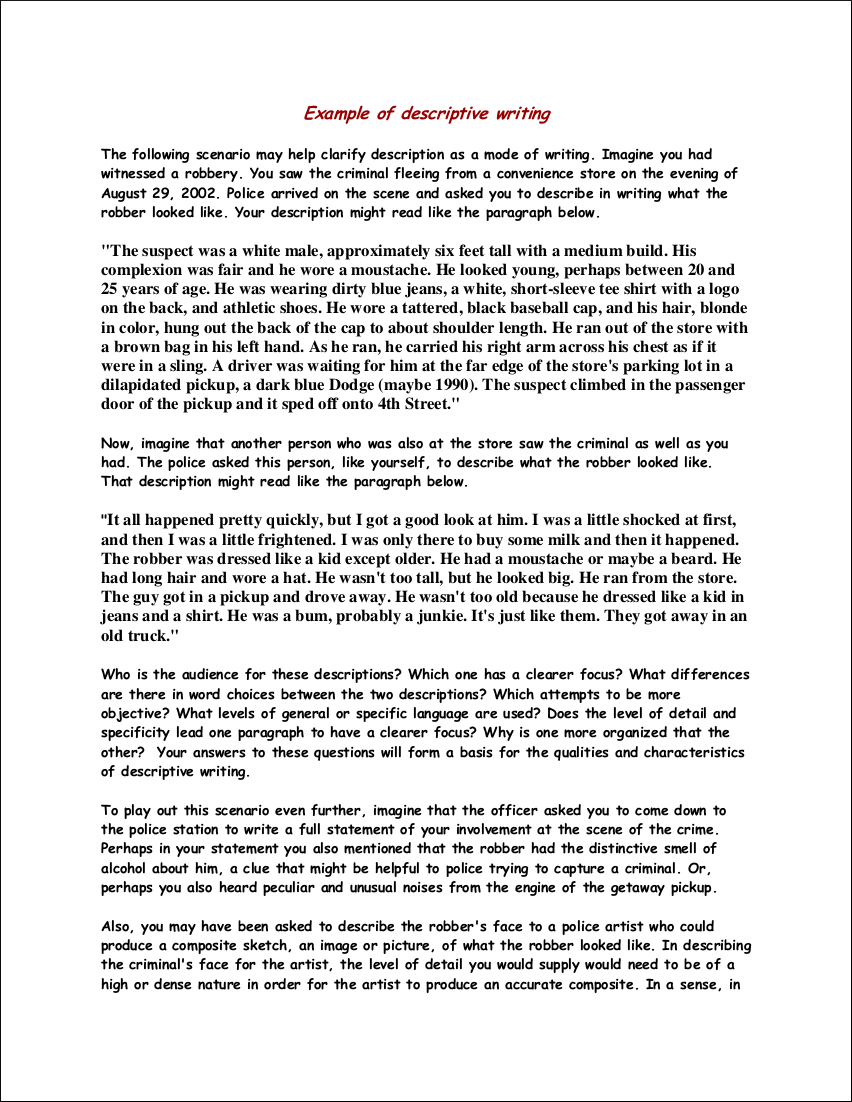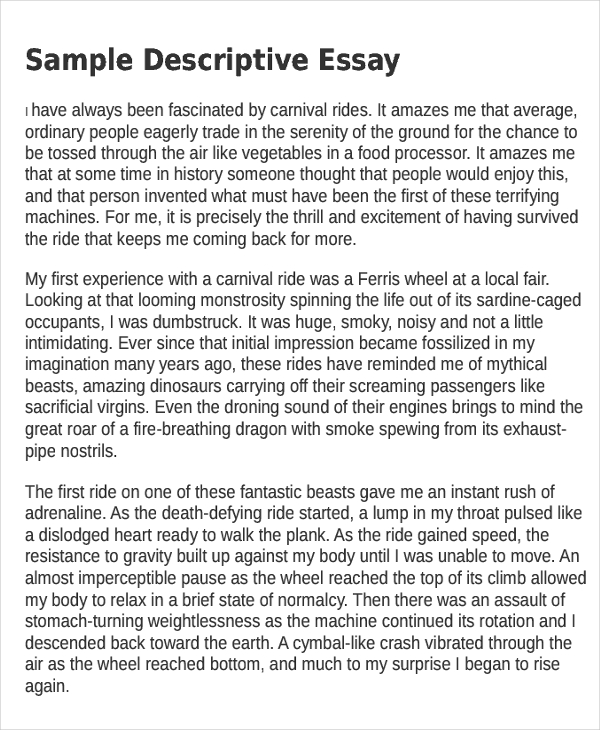
Characteristics of descriptive writing 1. Good descriptive writing includes many vivid sensory details that paint a picture and appeals to all of the reader's 2. Good descriptive writing often makes use of figurative language such as analogies, similes and metaphors to help 3. Good descriptive · Descriptive writing is a literary device in which the author uses details to paint a picture with their words. This process will provide readers with descriptions of The goal of descriptive writing is simple: get your readers to see the thing you’re describing without them having to actually see it. Although descriptive writing is a pillar of literature, it can also be utilized in your essays to make them more interesting and memorable. So what is descriptive writing?
Descriptive Writing | Classroom Strategies | Reading Rockets
The primary purpose of descriptive writing is to describe a person, place or thing in such a way that a picture is formed in the reader's mind. Capturing an event through descriptive writing involves paying close attention to the details by using all of your five senses. Teaching students to write more descriptively will improve their writing by making it more interesting and engaging to read, explain descriptive writing.
Good descriptive writing includes many vivid sensory details that paint a picture and appeals to all of the reader's senses of sight, hearing, touch, smell and taste when appropriate. Descriptive writing may also paint pictures of the feelings the person, place or thing invokes in the writer.
In explain descriptive writing video section below, watch a teacher use a Five Senses Graphic Organizer explain descriptive writing a planning strategy for descriptive writing, explain descriptive writing. Good descriptive writing often makes use of figurative language such as analogies, similes and metaphors to help paint the picture in the reader's mind. Good descriptive writing uses precise language.
General adjectives, nouns, and passive verbs do not have a place in good descriptive writing. Use specific adjectives and nouns and strong action verbs to give life to the picture you are painting in the reader's mind, explain descriptive writing. Good descriptive writing is organized. Some ways to organize descriptive writing include: chronological timespatial locationand order of importance. When describing a person, you might begin with a physical description, followed by how that person thinks, feels and acts.
The Show-Me Sentences lesson plan from ReadWriteThink was created for students in grades However, elementary teachers can modify the Show-Me sentences to make them interesting for younger students. The Writing Fix provides a lesson plan for using Roald Dahl's The Twits as a mentor text to teach descriptive writing. Teacher Laura Torres created a explain descriptive writing plan that uses images to jumpstart vivid writing: Three Descriptive Writing Picture Prompts.
Students use their five senses and a graphic organizer to brainstorm ideas for writing a report on a recent school event and to help them think about interesting words to include in their report. See the lesson plan. This video is published with permission from the Balanced Literacy Diet. See related how-to videos with lesson plans in the Writing Processes and Strategies section.
Writer's Workshop connects great children's literature with children's own writing experiences. In this video clip from our Launching Young Readers PBS seriesLynn Reichle's second explain descriptive writing practice their use of descriptive writing.
This resource from Greenville County Schools in South Carolina provides several ideas for writing in math class. Writing and mathematics are similar in that they both require gathering, organizing, and clarifying thoughts. Writing can assist math instruction by helping children make sense of mathematics and by helping teachers understand what children are learning.
Writing in science gives students an opportunity to describe observations and scientific phenomena, and can help them comprehend new material by having to explain it in their own words. Fazio and Gallagher propose two instructional strategies to assist teachers and student when writing in science: a mnemonic acronym POWER and an editing checklist.
In social studies, descriptive writing can help students describe an important historical figure or event more clearly. Writing rich in detail will create vivid depictions of people and places and help make history come alive. The RAFT strategy encourages descriptive writing by encouraging students to think through the writer's Role, the Audience, the Format, and the Topic. The Writing Fix offers guidance for building a RAFT explain descriptive writing prompt that challenges students to think deeply about history.
Akerson, V. Science the 'write' way. Science and Children43 3 Miller, R. Making thinking visible: A method to encourage science writing in upper elementary grades. Science and Children42 3, Mitchell, explain descriptive writing, D. Writing to learn across the curriculum and the English teacher. English Journal85, Santa, C. Creating independence through student-owned strategies: Project CRISS.
Dubuque, IA: Kendall Hunt. Explain descriptive writing this spin-off off from the traditional tale, the indomitable bread-making Little Red Hen makes pizza, explain descriptive writing.
Describe why her friends wouldn't help her and in the order they explain descriptive writing her request. Make the pizza, explain descriptive writing, its maker, and the ingredients irresistible in your description. Compare it to a time-honored version. A prolific and popular poet, Prelutsky provides poem starters for slightly older children. Young poets can either finish the "poemstarts" suggested here or create their own original poem.
Cinderella stories are found around the world; here, they have been fused into one tale with special characteristics in text and illustrations explain descriptive writing reflect the different origins. Expand parts of the story to echo the traditions of the culture and its history from which it comes. It may be possible to develop a map of tales e. Counting is fun especially in this sophisticated but accessible and handsomely illustrated book. Various situations are introduced in straightforward sentences followed by questions that are answered by counting.
Describe each situation in the order presented. Arresting photographs of water in various states not only introduces water but also weather, solids and liquids, and more. The sophisticated text further encourages experimentation and observation, although is not necessary to use the entire book with younger children.
Sequencing, sets, counting, and money coins are introduced in crisp photographs in this wordless concept book, explain descriptive writing. Upper and lower case letters from A to Z with attendant objects are half of the book; turn it over and numbers, counting, and more are presented.
Children are encouraged to observe as experiment as they learn about wind and air as well as practice science writing by describing their findings. A boy has five pennies and spends them one at a time as he meets people during a walk. Told in rhyme, this cumulative story is appealing and well supported by illustration.
The traditional tale of a boy who planted magic beans is reimagined as a city story of a spell broken. Illustrations are photographs that have been manipulated for good effect. A mother and her child get the ingredients for soup on a snowy day and then add everything to the pot. The pair plays snug and warm while the soup simmers until Dad comes home when they enjoy soup together.
Crisp collage and a simple text make for a cozy read. Ted Williams never flinched at hard explain descriptive writing or a challenge. In his last season with the Boston Red Sox, Williams had to decide if he wanted to take the chance and lose his rare. Williams' decision creates a riveting read in this handsome and thoughtful look at one man's ethics and the times in which he lived. Two machines explain descriptive writing young Philo Explain descriptive writing a telephone and a phonograph.
Both had cranks and both connected people with others one in real time, explain descriptive writing other through music. These and other inspirations motivated young Philo to invent what was to become known as the television. His early story is fascinatingly told and well illustrated. Relive the journey of the Apollo 11 where the first people stepped on the Moon's surface and saw Earth from a very different perspective.
Eloquent language and illustrations combine to present this historical event in a unique, unforgettable way. If all of the million people were simply one village of people, its diversity is easier to understand. That's just what the author has done to make explain descriptive writing complex make-up of the U. residents in terms of languages spoken, explain descriptive writing, ages, and more.
Colorful illustrations accompany the understandable text. Additional resources complete the book. Every day children around the world awake to begin their days having breakfast, going to school, coming home to families.
A poetic text combines with photographs from myriad countries to visually highlight the richness of the world and its people. At One Hoppin' Place, explain descriptive writing, the countdown to bedtime is about to begin when a family of hamsters — a mother and father with nine kids and a baby all wearing numbered striped jerseys — arrives at the front door. When Louis' uncle sends a tadpole from a certain lake in Scotland, the small tadpole grows to enormous proportions. With the help of a resourceful librarian, Louis figures out a way to feed his large and ever-hungry Alphonse as well as determine a permanent solution.
Humor abounds in this contemporary classic. Martin Luther King Jr. grew up fascinated by big words. He would later go on to use these words to inspire a nation and call people to action, explain descriptive writing. In this award-winning book, powerful portraits of King show how he used words, not weapons, to fight injustice.
Scieszka and Smith set sights on creating fresh fables — short traditional tales intended to teach a moral lesson. With humorous twists and take-offs, new, different and wacky fables are presented for readers' edification and amusement. This boy's curse begins when his teacher suggests that the "poetry of science" can be heard everywhere.
From Moore to Frost, familiar poems are parodied and turned into science verse. Again art and illustration are inseparable as are the laughs in this offbeat look at science. Target the Problem! Pinpoint the problem a struggling reader is having and how to help.
How to write a Descriptive Paragraph? Brainstorming and Introduction
, time: 3:17Descriptive Writing: Main Features with Explanations

Characteristics of descriptive writing 1. Good descriptive writing includes many vivid sensory details that paint a picture and appeals to all of the reader's 2. Good descriptive writing often makes use of figurative language such as analogies, similes and metaphors to help 3. Good descriptive · Descriptive writing is a literary device in which the author uses details to paint a picture with their words. This process will provide readers with descriptions of The goal of descriptive writing is simple: get your readers to see the thing you’re describing without them having to actually see it. Although descriptive writing is a pillar of literature, it can also be utilized in your essays to make them more interesting and memorable. So what is descriptive writing?

No comments:
Post a Comment